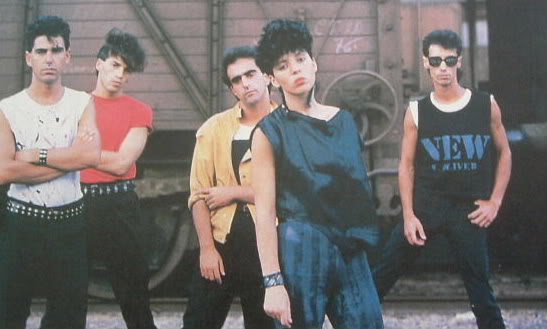Rádio Macau is a Portuguese band formed in Algueirão, Mem Martins, in the early 80’s. In 1993, the band suspended their activity, claiming tiredness and willingness to embark on other experiences. They returned as a band in 1998 and to records in 2000, with a different sound.
The band’s main success is the song “O Anzol”, which was included on the band’s third album, O Elevador da Glória. “O Anzol” was released as a single in 1988 and its sound has been compared to “Just Like Heaven”, by the English band The Cure, which came out as a single in October 1987.
It was 1980 and Xana, Flak and Alex all lived together at Xana’s house, in Algueirão (Sintra).
Flak and Alex played in Cranio and the lead singer was Uriel. They even changed their name to Local 13. From 1983 onwards they were called Rádio Macau, with Xana as the vocalist.
Keyboardist Filipe Valentim and drummer Emanuel Ramalho join the group. Some of the lyrics were by colleagues Vitinha and Pedro Malaquias. They record a first model with two themes, give their first concert and “A Noite” starts airing on Rádio Renascença. They manage to sign a contract with EMI, the first publisher they contacted.
In June 1984, the album “Rádio Macau” was released, produced by the group and Francisco and Pedro Vasconcelos. The most successful themes were “Bom Dia Lisboa” and “Um dia Mais”. Rádio Macau The disc also features a version of “No Comboio Descendente” by Zeca Afonso.
The group enters the studio to record “A Vida Num Só Dia”. The single was published in July 1985. When the first edition was sold out, a second edition was published in single and maxi-single versions.
In May 1986, they released the album “Spleen”, produced by Carlos Maria Trindade. They perform several concerts abroad with visits to Spain (14 concerts), Berlin and Thessaloniki (Greece).
Drummer Alberto Garcia joined the band in 1987. The album “O Elevador da Glória”, produced by Flak and Amândio Bastos, was released in November of that year. The group wanted to make a simpler record and the successes followed with “Anzol”, “O Elevador da Glória” and “Cidade Fantasma”.
In April 1988, a remix of “Anzol” by Flak and Armindo Bastos was published in maxi-Single.
“O Rapaz do Trapézio Voador”, published in October 1989, includes classics such as “Hoje é a Brincar”, “Tomorrow is Always Too Far” and “Só Para Matar o Tempo”. Beto Garcia leaves the group after recording the album and is replaced by Luís San Payo.
In December 1991, “Disco Pirata” was released with live recordings in various locations. The album, edited by the group’s label – Alcobia Records, includes unique versions such as “O Homem Transparente”, with Rafael Toral, and “Bom Dia Lisboa” with tablas and guitar by Rui Fingers. The CD version also includes the songs “Histórias Sobre Edifícios a Arder”, the instrumental “Lou Harrison”, “Entre a Espada e a Parede” and two versions by José Afonso (“Por Detrás Daquela Janela” and “Maio Maduro Maio” ). The CD and LP editions sold out quickly.
The album “A Marca Amarela” was released by BMG in October 1992. The group achieved its first silver record. The presentation theme was “O Hábito Faz o Monstro” released in EP and CD-Single formats.
In 1993, several remixes of the theme “Diz Quem Diz” were made. The group suspends activities due to fatigue from more than 10 years of rehearsals, recordings and concerts. This suspension prevents the group from participating in the “Filhos da Madrugada” compilation.
The group met again at the end of 1998. Xana, Flak, Alex and Luís Filipe Valentim were joined by the returning Beto Garcia.
In 1999 they participated in the tribute album to Xutos & Pontapés with a version of “Morte Lenta”.
In early 2000 they returned with a concert in Almada. In September of that year, the album “Onde o Tempo Faz a Curva” was released, which had a more electronic sound. The album was recorded in the group’s studio. The first single was “A Matter of Time”.
The compilation “A Vida Num Só Dia” was released in October 2001. On December 8, the group celebrated its 18th anniversary with a concert at the Olga Cadaval Auditorium, in Sintra.
In November 2003, the album “Acordar” was released. One of the guests is Ana Deus in the theme “We Too”.
The “Livro Pirata” is edited by Transformadores, which includes a CD with most of the alignment of the “Disco Pirata” originally edited in 1991.
The band recorded in 2008 the 8th album of originals, which they simply call 8.






[…] in Lisbon, October 18, 1961), is a musician, composer, producer, and co-founder of bands such as Rádio Macau and Micro Audio […]
[…] Zeca Afonso, Madredeus, Xutos & Pontapés, Rádio Macau, Azeitonas. Yes, there could be many others […]
[…] Zeca Afonso, Madredeus, Xutos & Pontapés, Rádio Macau, Azeitonas. Yes, there could be many others […]
[…] released due to the bankruptcy of the label. In 1986, he produced the album “Spleen” by Rádio Macau. In the following years, he produced the album “Circo de Feras” by Xutos & […]